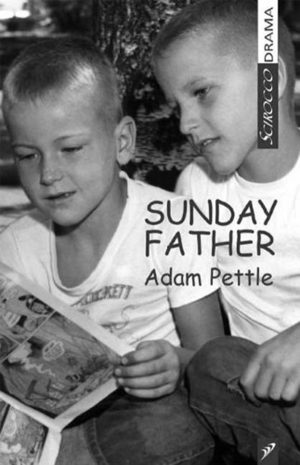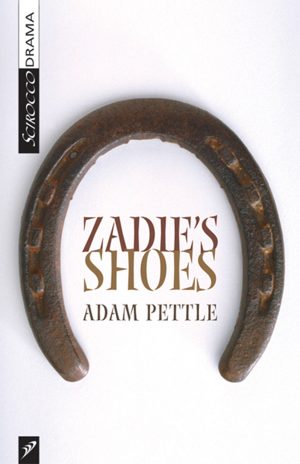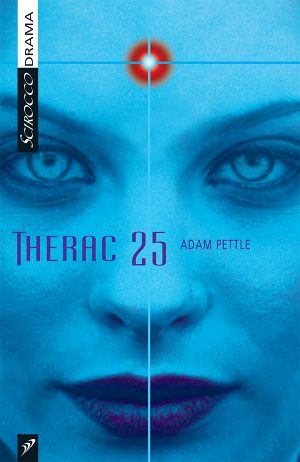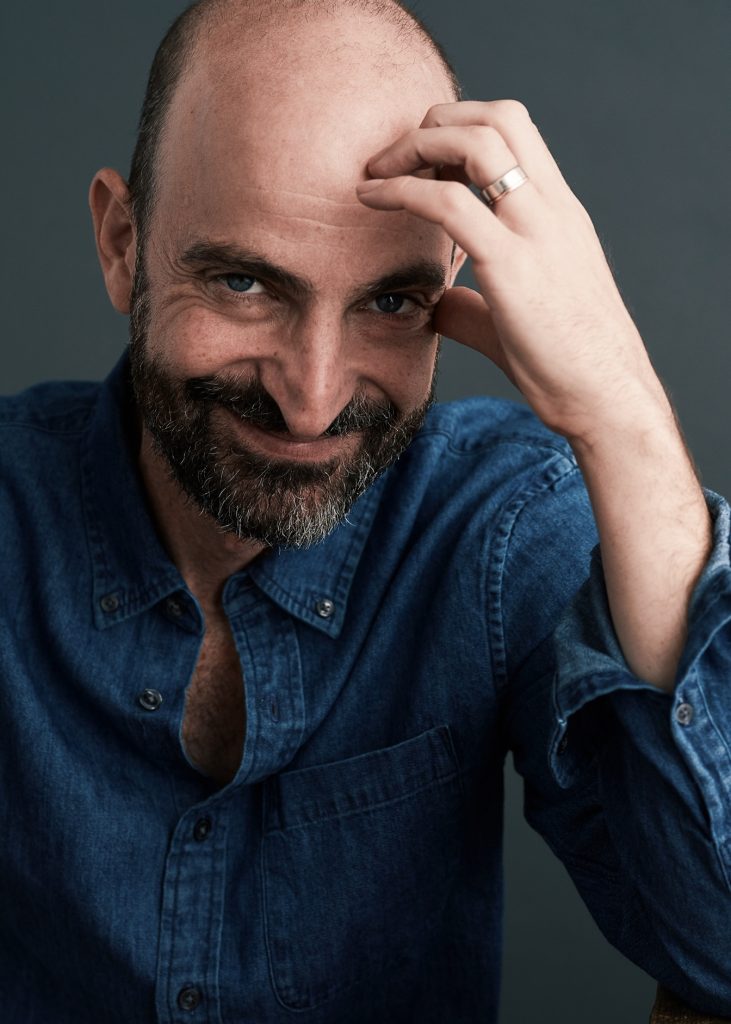Posted February 7, 2022
The Interview – Adam Pettle
Adam Pettle
Adam Pettle is a Toronto playwright, television writer, and producer. His plays include Therac 25, Zadie’s Shoes, Sunday Father, and an adaptation of Miklos Laszlo’s Parfumerie (co-written with Brenda Robins.) Adam was one of the creators of the CBC Radio drama Afghanada, and has worked on several television series, including Rookie Blue, Saving Hope, X Company, The Detail, Burden of Truth, and Nurses.
Your first three plays (Therac 25, Zadie’s Shoes, and Sunday Father) were critically acclaimed box office hits, and each of them earned a Dora Mavor Moore Award nomination for Outstanding New Play. What was it like to have such tremendous success so early in your playwriting career?
I handled the “success” early in my career like any twenty-something writer worth their salt, not well. Not very well at all.
See, before then, I had only ever written for myself, filling black bound journal after journal in cancer hospital waiting rooms or divey sports bars on the Plateau (RIP Primetime) and suddenly my personal life, all the intimate details, and my primal wounds were on display—I didn’t know where else to write from—I still don’t—eight shows a week, for every Bubie who came down from the burbs for a night of “culture” at the Factory Theatre to check it out. This made me feel incredibly vulnerable and because of that, and who I am, I behaved more and more compulsively. The attention and pressure I put on myself to follow up a sold-out run led me into an unconscious state, where I was often careless of my own well-being and the welfare of the people around me. I might have been blowing up as a dramatist, but I was also just blowing up in general. And also “blowing” pockets full of royalty cash on the Park Hyatt rooftop or off-track betting in a seedy basement in Chinatown.
And then, of course, no one ever told me about a little thing called personal income tax.
I was a mess. But then who wasn’t at 25? Or 35? 45 anyone?
Don’t get me wrong, it was also a shit-ton of fun.
Your play Therac 25 is a moving story about two young people who fall in love while receiving cancer treatment. I know that many years ago you underwent cancer treatment—can you tell us how that experience informed the play?
Therac 25 was based on extensive journals I kept while undergoing treatment for papillary thyroid cancer when I was 21. I always fantasized about meeting a beautiful woman with terminal cancer and the torrid, tragic love affair we’d have. I never met her so… I made her up.
Therac is a one-act, two-handed love story—a dark comedy about cancer—set in the corridors of the Princess Margaret Hospital where I spent the better part of 1995. Therac was the first play I ever wrote (if you don’t count “Skyrats,” which I penned in the ninth grade, about grifters who lived in an abandoned warehouse on the Lakeshore, an homage or complete rip-off, depending on who you ask, of a Judith Thompson play.)
And even though it clocks in at less than an hour, Therac is probably still the most important piece of writing I’ve ever done. Not only did it keep me sane during a terrifying chapter of my life but then, a decade later, it also brought the greatest love I’ve ever known into it. When my brother Jordan (who was directing the Factory production) asked an actor named Trish Fagan if she’d play the part of Moira—where she’d basically have to carry me in this pas de deux, for I was not, and still am not, a very good actor—Trish agreed to take the gig. And since it was just the two of us at the opening night party well… we’ve been together since opening night, over twenty years ago now, have two of the most hilarious and beautiful children together and so, turns out, she did exist, I just had to wait to meet her and it was well worth the wait. So, yeah, Therac launched my writing life and brought Trish into it. In short, Therac 25 made it rain.
Who or what do you count among your playwriting inspirations and influences?
Oh man.
The poetry of Mary Oliver. And Billy Collins. And Emma Healey. And Leonard Cohen. And Megan Gail Coles. The left arm of Jimmy Key. The plays of David Mamet, Hannah Moscovitch, Sam Shepard, Arthur Miller, Annie Baker, Tennessee Williams, Anton Chekhov. His prose isn’t too shabby either. Neither is Dostoevsky. My kids. My ancestors. Snippets of dialogue I hear in line at A&W. Pretty much anything that shows fears, rage, jealousy, those all-too-human traits one tends to deny, the stage is the place for them; and when writing a play I pray to have a response to it all—all the messy, ugly, beautiful humanness.
In recent years, you have been doing a lot of writing and producing for television. (Full disclosure, I am a huge fan of Burden of Truth.) You have an impressive list of television credits that also includes Rookie Blue, Saving Hope and Nurses. What do you like about television writing? What are some of the challenges of TV writing compared to playwriting?
I love Burden too.
It’s probably the piece of work I am most proud of being a part of in my TV writing life.
The show had a huge beating heart and something to say—which was thanks to its creator Brad Simpson and its two blazing stars, Kristen Kreuk and Peter Mooney.
And also, Winnipeg, which is a very cold but magical place.
What I like most about television writing is that it’s a team sport. I grew up playing baseball (in fact, I’d still put down my pen forever if I could pitch one scoreless inning in Yankee Stadium) and learned a ton about leadership and life in general on the ball diamond and being part of a team. A writing room is similar. Replace the ball yard with an asbestos-packed production office in Mississauga—to keep with the sports metaphor. Where playwriting is like standing alone on the tennis court, TV writing is more like rugby. No one knows who’s in the scrum or who’s going to emerge from it alive and yes, if even you do, you’ll probably get an ear or two ripped off in the process but… all that really matters is if the team has a winning season, together.
See, no one really knows who wrote episode 3, Season 2 of Burden of Truth (unless you worked on the show) it’s Kristen and Peter on the poster, not us word-goblins in the writing room, and there’s a creative freedom in that. Coming from the theatre where there’s an auteur model of creation and the writer herself is often thrust into the spotlight, where she is usually most uncomfortable—in TV writing you can remain fairly anonymous, which I like.
Also having other writers around and being paid well to help you solve your second-act problems is life-changing, not being so alone in it all the time. I’ve grown so reliant on this, the team sport aspect of it, over the past several years that the thought of floating back out in the kayak, adrift in the middle of the ocean, alone, and writing another play is beyond daunting.
But, the pandemic did actually force me back into the solo sport of writing. I’m actually working on a non-fiction memoir called The Vig and did just write “fin” on a draft of the first play I’ve written in over a decade, called Man-child. And yes, I know writing “fin” at the end of your manuscript, if you’re an English dude who grew up in East York is pretentious, but you can get away with that in playwriting. I miss that too.
The biggest challenge of TV writing is that it is not a writer-driven medium and so pretty much anyone can fuck with your shit. The words on the page are more of a suggestion to the actors than gospel, like they are in the theatre. People change your words on the fly and not just actors: studio execs, casting agents, the producer’s kid, the craft guy… because at the end of the day, as a staff writer on a television show, you don’t own your work; as Don Draper tells Peggy in that hotel room, “That’s what the money is for.”
What have things been like for you and your family during the pandemic? Did you have to do any “pivoting”? Has home schooling been part of the mix? Also: feel free to tell us about your talented family members and what they’ve been up to!
Like for most folks I think, the lockdown, throw down, slowdown, has been a lot of different things. At times we’ve been riding the pink-cloud euphoria of being forced to slow down and at other times (much of the time) it has been a total grind. It’s forced us to a least try to stay anchored to the present moment, take things one day at a time, sometimes an hour at a time—but yeah, the home schooling was a gong show.
For a few weeks Trish and I turned into insane cartoon teacher versions of ourselves, posting bristol board schedules that included military math drills and daily Qi Gong. Until our kids finally staged a mini-intervention where they pleaded with us to “just be their parents again” and we snapped out of it. Since then, we have been trying to hold the zoom school—and pretty much everything—as lightly as we possibly can. And have some fun in the cracks too.
As for my brilliant family members who continue to be brilliant: Trish (Fagan) is back at school, University of Waterloo, finishing her English degree—and getting marks that I only ever dreamed of. And my brother Jordan is acting, teaching, directing and continuing his reign as the world’s best dad in the commonwealth.
What’s the best piece of writing advice that you’ve ever received?
Get dressed every day.
I received this gem from my friend and fantastic writer Semi Chellas, who I believe got it from a teacher of hers at Yale University. I did not go to Yale, for I am not nearly as smart as Semi Chellas… I suppose that’d be another piece of advice: Surround yourself with people who are smarter than you and then practice humility and listen to them. Listen. Even to the people you don’t agree with. Maybe even more to them… Really listen. And then pray that your response to it on the page and stage is at least mildly entertaining.
Adam, I Googled you in preparation for this interview. To my surprise, I found a mention that as a teen, you were a well-known break dancer. I now feel like I would be remiss if I didn’t ask you to tell us about that!
I have no comment on that other than, if anyone in the writing community, theatre, TV, or otherwise wants to meet me in the Loblaws parking lot with a cardboard box, boom box and a painter’s hat, you can see it for yourself. Break off time!
-
 Sunday Father$12.95
Sunday Father$12.95 -
 Zadie’s Shoes$14.95
Zadie’s Shoes$14.95 -
 Therac 25$14.95
Therac 25$14.95

